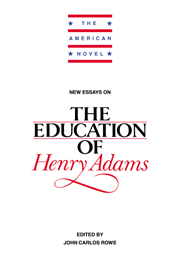Book contents
- Frontmatter
- Contents
- Series Editor's Preface
- 1 Introduction
- 2 The Education of an American Classic: The Survival of Failure
- 3 Being a “Begonia” in a Man's World
- 4 Henry Adams's Education in the Age of Imperialism
- 5 The Education and the Salvation of History
- Notes on Contributors
- Selected Bibliography
- Index
3 - Being a “Begonia” in a Man's World
Published online by Cambridge University Press: 15 December 2009
- Frontmatter
- Contents
- Series Editor's Preface
- 1 Introduction
- 2 The Education of an American Classic: The Survival of Failure
- 3 Being a “Begonia” in a Man's World
- 4 Henry Adams's Education in the Age of Imperialism
- 5 The Education and the Salvation of History
- Notes on Contributors
- Selected Bibliography
- Index
Summary
In 1870 the North American Review printed a free-lance piece on the recent congressional session by Henry Adams. Senator Timothy Howe, Republican from Wisconsin, shot back a rejoinder that judged Adams's worth in regard to a series of career choices. Adams as journalist recording the facts: “He must fail as a historian.” Adams as literary man: “The author has a talent for description and a genius for invention. He might succeed as a novelist.” Adams as member of the Adams family, inextricably associated with the vocation of statesmanship:
The author is proclaimed to be not only a statesman himself but to belong to a family in which statesmanship is preserved by propagation – something as color in the leaf of the Begonia, perpetuating resemblance through perpetual change.
Thirty-five years later, in looking back upon 1870 in the chapter from his Education entitled “Chaos,” Adams refers to that long-ago reference in order to make his own mocking observations.
The begonia is, or then was, a plant of such senatorial qualities as to make the simile, in intention, most flattering. Far from charming in its refinement, the begonia was remarkable for curious and showy foliage; it was conspicuous; it seemed to have no useful purpose; and it insisted on standing always in the most prominent positions. Adams would have greatly liked to be a begonia in Washington, for this was rather his ideal of the successful statesman.…
- Type
- Chapter
- Information
- New Essays on The Education of Henry Adams , pp. 49 - 86Publisher: Cambridge University PressPrint publication year: 1996
- 3
- Cited by

